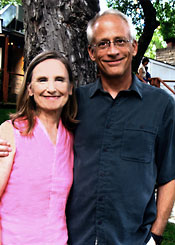
Melanie Spence
Associate Dean of Undergraduate Education, School of Behavioral and Brain Sciences (BBS)
Professor - Department of Psychology
Director, BBS Honors Program
Research Interests: Studies how and when young infants process communicative cues in faces and voices; mechanisms of face perception
Professional Preparation
Ph.D. - Experimental Psychology
University of North Carolina at Greensboro
University of North Carolina at Greensboro
M.A. - Experimental Psychology
University of North Carolina at Greensboro
University of North Carolina at Greensboro
B.A. - Psychology
Emory University
Emory University
- Psychology
Converse College
Converse College
Research Areas
Research Interests
Current research examines young infants' processing of voices and speech. One specific focus is the study of infants' categorization of infant-directed (ID) utterances that communicate different affective messages (e.g., approving vs. comforting). Other research interests include young children's memory for voices, speech, and faces.
Publications
Spence, M. J., Granier-Deferre, C., et Schaal, B. (2017). L’étude du comportement est unique pour comprendre la cognition fœtale et néonatale — L’imagerie cérébrale la compléte lorsqu’elle s’inspire de validité écologique. Enfance, 3, 307-328; 2017 - Publication
Busnel, M-C., Fifer, W., Granier-Deferre, C., Lecuyer, R., Mischel, G., Moon, C., Panneton, R., Schaal, B., Spence, M. (2017). Tony DeCasper, the man who changed contemporary views on human fetal cognitive abilities. Developmental Psychobiology, 59,135-139; DOI 10.1002/dev.21478. 2017 - Publication
Shepard, K., Spence, M. J., & Sasson, N. J. (2012). Distinct Facial Characteristics Differentiate Communicative Intent of Infant-Directed Speech. Infant & Child Development, 21(6), 555-578. doi:10.1002/icd.1757 2012 - Publication
Jerger, S., Damian, M., Spence, M. J., Tye-Murray, N., Abdi, H. (2009). Developmental shifts in children's sensitivity to visual speech: A new multimodal picture word task. Journal of Experimental Child Psychology, 102, 40-59. 2009 - Publication
Thierry, K. L., Lamb, M. E., Pipe, M. E., & Spence, M. J. (2009). The flexibility of source-monitoring training: Reducing young children's source confusions. Applied Cognitive Psychology. Published online in Wiley InterScience. (www.interscience.wiley.com) DOI: 10.1002/acp.1574. 2009 - Publication
Touchstone, E. W., Spence, M. J., & Atchison, K. K. (2008), Infants categorization of dynamic emotional expressions: Changes from 6 to 10 months. Poster presented at the International Conference on Infant Studies, Vancouver, BC. 2008 - Presentation
Atchison, K. K., Spence, M. J., & Touchstone, E. W. (2008). The impact of faces on infants categorization of infant-directed speech. In M. Goldstein (Chair), New functions of Infant- directed speech: Evidence from word learning and categorization. Symposium conducted the International Conference on Infant Studies, Vancouver, BC. 2008 - Presentation
Atchison, K. K. & Spence, M. J. (2007). Four-month-old infants' categorization of infant-directed speech when viewing female, male, and scrambled faces. Poster presented at the Biennial Meeting of the Society for Research in Child Development, Boston, MA. 2007 - Presentation
Awards
Recognized among Converse College’s 125 Outstanding Alumnae Awards Recipients presented during College’s 125th Anniversary Celebration. Honorees were chosen for high achievement and/or service in one or more of the College’s Core Values of Excellence, Integrity, Exploration, Diversity, Respect, Community and Progress. https://www.converse.edu/alumni/serve/alumni-achievement-awards/previous-alumni-achievement-award- recipients/ - Converse College, Spartanburg S.C. [2014]
Fellow - Association for Psychological Science [2010]
Research paper (DeCasper & Spence, 1986) voted one of top 20 child psychology studies in survey of membership of Society for Research in Child Development: Dixon, W. (2003). Twenty studies that fascinated child psychology, Developments, Newsletter of the Society for Research in Child Development, 46, 4-5. [DeCasper, A. J. & Spence, M. J. (1986). Prenatal maternal speech influences newborns' perception of speech sounds. Infant Behavior and Development, 9, 133-150.] - [2003]
Callier Scholar Award - Callier Center for Communication Disorders, UTD [2001]
Phi Beta Kappa - Emory University [1978]
Appointments
Professor
The University of Texas at Dallas [2006–Present]
The University of Texas at Dallas [2006–Present]
BBS Associate Dean of Undergraduate Education
The University of Texas at Dallas [2010–Present]
The University of Texas at Dallas [2010–Present]
Director, BBS Undergraduate Honors Program
School of Behavioral and Brain Sciences, UT Dallas [2013–Present]
School of Behavioral and Brain Sciences, UT Dallas [2013–Present]
B.S. Psychology Program Head
The University of Texas at Dallas [2010–2013]
The University of Texas at Dallas [2010–2013]
B.S. Child Learning and Development Program Head
The University of Texas at Dallas [2010–2013]
The University of Texas at Dallas [2010–2013]
Ph.D. Psychological Science Program Head
The University of Texas at Dallas [2005–2013]
The University of Texas at Dallas [2005–2013]
M.S. Psychological Science Program Head
The University of Texas at Dallas [2005–2010]
The University of Texas at Dallas [2005–2010]
Ph.D. Developmental Psychology Area Director
The University of Texas at Dallas [1997–2000]
The University of Texas at Dallas [1997–2000]
Associate Professor
The University of Texas at Dallas [1996–2006]
The University of Texas at Dallas [1996–2006]
Assistant Professor
The University of Texas at Dallas [1989–1996]
The University of Texas at Dallas [1989–1996]
Presentations
UNC-Greensboro Doctoral Hooding Ceremony Address Fall 2018: "Navigating a Meaningful Career"
Invited Presentation for Doctoral Hooding Ceremony for the University of North Carolina at Greensboro,"Learning About the World: An Infant's Perspective"
Lecture for The Center for Children and Families 2010 Annual Spring Lecture Series. The 2010 Series centered on the theme of raising healthy infants. The talks emphasized language and learning in infancy.Additional Information
Professional Memberships
- Association for Psychological Science
- International Congress of Infant Studies
- Society for Research in Child Development
- International Society for Developmental Psychobiology
- Cognitive Development Society
- Psychonomic Society
News Articles
UNCG awards 112 doctoral degrees at hooding ceremony
Posted on December 11, 2018Despite the chilly temperatures outside, UNCG Auditorium was a warmth of celebration Thursday, Dec. 6, as 112 doctoral graduates were honored at UNCG’s Doctoral Hooding Ceremony.
“Doctoral education serves as the incubator for growing the commitment, passion, and vision of many of the individuals tasked with providing leadership at the local and global level as we navigate an ever-changing, complex, and complicated world,” Chancellor Franklin D. Gilliam, Jr. said in his remarks to the graduates.
The ceremony, a more intimate predecessor to the commencement exercises held on Friday for bachelor’s and master’s degree candidates, recognized scholars in four fields of achievement: doctor of education, doctor of musical arts, doctor of nursing practice, and doctor of philosophy.
Dr. Melanie Spence addressed the graduates, encouraging them to keep an open mind.
“Life has a way of throwing us curve balls,” said Spence, who is associate dean of undergraduate education and professor of psychology at The University of Texas at Dallas. “If that happens, it’s important to be open to new opportunities.”
Develop relationships that support collaboration, she added, and continue to seek out mentors.
Each candidate was hooded by their committee chair and crossed the stage with pride, often to a backdrop of whistles and applause from family and friends.
In his final charge to the graduates who have achieved the highest degree in academics, Gilliam said:
“We will look to you – our newest doctors – to be the guardians of higher education, of the critical importance of doctoral education, and of the indisputable role that the expertise, experience, and dedication that doctoral education conveys in furthering the betterment of society for future generations.
“Congratulations, doctors. It’s my great pleasure to welcome you to the family.”
By Elizabeth L. Harrison
Photography by Martin W. Kane
Expert on Infant Learning Honored by Peers
 By Office of Media Relations | Oct. 2, 2009
By Office of Media Relations | Oct. 2, 2009 A psychological research organization has honored a UT Dallas infant learning expert who studies how babies make sense of voices, facial expressions and other communication signals.
In recognition of her “sustained outstanding contributions to the advancement of psychological sciences,” Dr. Melanie Spence was recently named a Fellow of the Association for Psychological Science (APS).
“I am honored by the election to Fellow status and grateful to the APS Board for recognizing my research,” said Spence, who is a professor in the School of Behavioral and Brain Sciences.
Spence directs the Infant Learning Project, a research program that studies how and when infants under 1 year of age distinguish speech and facial cues that communicate different messages. The research is conducted by showing infants a series of faces and speech stimuli via a computer monitor and observing infants’ attention to changes in the stimuli.
“When adults speak to infants, they vary the pitch and timing of their speech depending on the situation,” said Spence. “For example, adults talk with lower-pitched speech to comfort a distressed infant and higher-pitched speech with more exaggerated intonation to communicate approval to infants.”
Spence and her colleagues have learned that infants begin to distinguish these differences between 4 and 6 months of age.
“We have found that infants become more skilled between 6 and 10 months of age at distinguishing emotions – such as ‘happy’ and ‘disgust’ – on realistic, moving faces,” said Spence.
Infants’ detection of emotional signals in faces and voices is important for maintaining effective social interactions with parents and other caregivers. According to Spence, these findings shed light on early skills involved in social-communicative functioning.
The studies exploring infants’ processing of facial emotions were conducted with Dr. Emily Touchstone, director of the UT Dallas Infant Development Program.
Parents interested in participating in the Infant Learning Project may complete an online form.
In addition to conducting the Infant Learning Project, Spence serves as program head for the graduate programs in psychological sciences and is affiliated with the Center for Children and Families and the Callier Center for Communication Disorders.
Conference to Emphasize Undergraduate Psychology Research
 By Office of Media Relations | April 12, 2012
By Office of Media Relations | April 12, 2012 Undergraduate psychology majors will get a chance to display their research accomplishments at an upcoming conference sponsored by UT Dallas and other area universities.
The North Texas Undergraduate Psychology Conference will take place on UT Dallas’ main campus in Richardson, but it represents a joint effort by psychology departments at Southern Methodist University, Texas Woman’s University and The University of Texas at Arlington, as well as UT Dallas. The conference was funded in part by a grant from Psi Chi, the international psychology honor society, to UT Dallas’ newly established chapter.
BBS Researchers Work in Program Honoring Late Prof, Spouse
By Office of Media Relations | July 30, 2012 Ryan Buhrmester, son of Duane and Linda Buhrmester (right), congratulates award recipients (back, from left) Kendall Marshall, Allyson Rice and Amy Zwierzchowski-Zarate; and (front, from left) Susan Sipe and Rose Ashraf.
Ryan Buhrmester, son of Duane and Linda Buhrmester (right), congratulates award recipients (back, from left) Kendall Marshall, Allyson Rice and Amy Zwierzchowski-Zarate; and (front, from left) Susan Sipe and Rose Ashraf.Five undergraduates in the School of Behavioral and Brain Sciences are spending the summer as researchers and working alongside their faculty mentors, thanks to a fund established to honor the late Dr. Duane Buhrmester.
The BBS Summer Scholars received the Duane and Linda Buhrmester Research Award, which was created to encourage students’ professional development. They were honored at a luncheon in June. The awards will be presented annually in the future.
Dr. Duane Buhrmester served as associate dean of undergraduate education for BBS from 1997 until 2010, when he and his wife Linda died in a mountain climbing accident. Buhrmester was committed to providing undergraduates at UT Dallas with a strong foundation in research and spent countless hours mentoring students.
The five undergraduates receiving the award this summer include two students majoring in psychology, two students in neuroscience, and one student majoring in speech-language pathology and audiology. A faculty committee evaluated applications and based its selections on the students’ commitment to research and academic accomplishments.
 Linda and Duane Buhrmester
Linda and Duane BuhrmesterAllyson Rice is an award recipient who is scheduled to graduate in December with bachelor’s degrees in psychology and criminology. She plans to attend graduate school and pursue a PhD in social psychology.
“This summer I will be working on multiple experiments,” said Rice, who will assist Dr. Alice O’Toole, the Aage and Margareta Moller Professor in Neuroscience. “I will examine what types of images people find best suited for identification purposes. I will also look at differences in gaze strategy between male and female participants in an identification-matching task.”
A $200 financial award will go to each scholar, and their faculty sponsors will receive support for the students’ summer research projects. BBS will inscribe the names of annual recipients on the Duane and Linda Buhrmester Undergraduate Research Award plaque every year, beginning with this summer’s group.
“The BBS Undergraduate Studies Committee decided that supporting student research was an appropriate way to honor both Duane and Linda.”
Dr. Melanie Spence,
associate dean of BBS
“The BBS Undergraduate Studies Committee decided that supporting student research was an appropriate way to honor both Duane and Linda,” said Dr. Melanie Spence, associate dean of BBS. “Duane developed avenues for BBS students to acquire important research experience within our degree plans and strongly encouraged students to engage in research opportunities. Linda, who was trained as a child development professional, appreciated the value of research for informing practice and policy in child development. We are excited that the Buhrmester Development Fund provides this opportunity to continue Duane’s efforts to support students’ research training.”
Susan Sipe is another student scholar who will graduate in December with a bachelor’s degree in speech-language pathology and audiology. She then intends to pursue a master’s in communication disorders.
This summer she will work with Dr. William Katz, an associate professor at the Callier Center for Communication Disorders. They will study individuals who have severe speech loss, analyzing data after kinematic testing using electromagnetic articulography.
“The experience in the speech lab will deepen my understanding of the need to prepare conscientiously for a career teaching children and adults to express themselves through language,” Sipe said.
Media Contact: The Office of Media Relations, UT Dallas, (972) 883-2155, newscenter@utdallas.edu.
Researchers Launch Infant Screening Initiative
By Office of Media Relations | Sept. 22, 2009Two UT Dallas researchers — Emily Touchstone and Suzanne Bonifert — have launched a pilot program to identify screening measures that could be conducted quickly and used together to provide a thorough picture of an infant’s development.
The result of their efforts, the Infant Development Program (IDP), which is part of the Center for Children and Families and the School of Behavioral and Brain Sciences, was created to research, identify and prevent developmental disorders during the earliest stages of life.
Clinicians in the program conducted the first infant screening on Sept. 14 at the Callier Center for Communication Disorders.
“We are very pleased to offer developmental screenings to parents in North Texas,” said Touchstone, a clinical assistant professor in the School of Behavioral and Brain Sciences and head of the program. “Our screenings will provide information to parents who are curious about their babies’ development, or parents who suspect there might be a problem.”
The comprehensive screenings evaluate children’s abilities in the following areas:
- Cognition — thinking, problem solving and categorizing.
- Gross motor skills — sitting, crawling, standing and walking.
- Fine motor skills — reaching, transferring, pointing and scribbling.
- Receptive language — language that the child understands.
- Expressive language — language that the child uses to communicate with others.
- Social-emotional skills — behavior regulation and social connectedness.
The IDP screenings are for infants and toddlers up to 30 months of age. Parents can register for the screenings by contacting the IDP. All screenings take place at the Callier Center.
Unique to the program is the inclusion of current and future research collaborations at UT Dallas. Dr. Melanie Spence, also a professor in the School of Behavioral and Brain Sciences, is the program’s research coordinator.
“When families visit the Callier Center for screenings, they will also have the opportunity to participate in other research programs that are available at the time of their visit,” added Touchstone.
The Center for Children and Families is funded by a grant from the Meadows Foundation. The center offers an array of clinical and community outreach activities, organized around three initiatives: parenting healthy families, strengthening interpersonal relationships and enhancing thinking and learning.
Media Contact: Debra Brown, UT Dallas, (214) 905-3049, debra@utdallas.edu
or the Office of Media Relations, UT Dallas, (972) 883-2155, newscenter@utdallas.edu